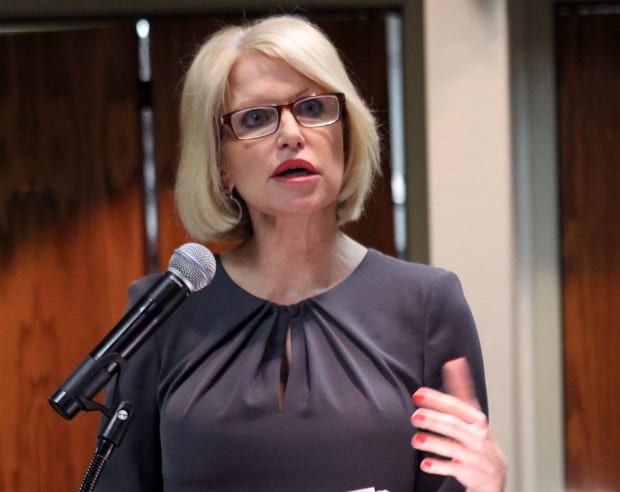D.A. addresses concerns about prosecuting attacks as hate crimes

D.A. Susan Hawk said every day she walked her dog near the spot where a gay man was attacked.
(David Taffet/Dallas Voice)
DAVID TAFFET | Senior Staff Writer
taffet@dallasvoice.com
In a Monday night, Dec. 14, meeting at Cathedral of Hope, Dallas County District Attorney Susan Hawk addressed a crowd already jittery from a series of attacks in the neighborhood and frustrated by a recent meeting with representatives of the FBI and Department of Justice who refused to address ongoing investigations.
But Hawk’s approach was different. She said she lived on Rawlins Street at Wycliff Avenue and had always felt safe in her community — until someone was attacked two blocks down Rawlins, where, she said, she walked her dog every night.
Because of that, she said, the attacks are very personal to her. “This concerns me too,” Hawk said. “I walk by there every single day.”
While the D.A.’s office can’t investigate crimes or make arrests, Hawk said if police make an arrest and give her evidence that allows her office to pursue hate crime charges, she definitely will.
To make the point that her office is serious about the Oak Lawn attacks, Hawk brought with her more than 15 assistant district attorneys and investigators.
Police officials at the meeting wanted to make the community knows Dallas PD is investigating recent attacks while providing as much protection in the neighborhood as possible. Northeast Patrol Division Chief Katrina Shedd attended the meeting with more than 10 officers and detectives.
Sheriff Lupe Valdez also attended, bringing with her four members of her staff.
Hawk said that while there’s little her office can do to help police other than assure them she plans to prosecute these cases when a suspect is caught, she does want the police and the community to know her office is concerned.
“We talk about these cases on a daily basis,” she said.
She also made a promise to the community: “If an individual targets a group because of who they are, I promise you [this] office will prosecute to the fullest extent of the law.”
Randy Blankenbaker, assistant chief with DPD’s Northwest Patrol Division, updated those attending on the investigation, saying there’s no evidence at this time indicating the recent attacks in Oak Lawn are gang-related. He also said police have tried tracing phones, which have been the only items stolen in several cases, but that hasn’t turned up any leads.
“We’ve done all those things and more,” Blankenbaker said.
He also addressed what he described as the appearance of an initially slow response by police. Before police saw the attacks as related, he said, several more took place.
Then, as police started investigating, they connected the more recent attacks with several other incidents that took place before the attack on the day of the Alan Ross Texas Freedom Parade, the incident that first began focusing attention on the situation.
Hawk also said she understands the damage that simply throwing out crime statistics can do to victims.
“The crime rate’s down,” she said. “Victims don’t want to hear that.”
Burke Burnett, a survivor of an anti-gay hate crime in Paris, Texas several years ago, said he appreciated the D.A.’s approach.
“A victim wants to hear what’s being done on his case,” Burnett said. “They want to see justice done.”
Instead of focusing just on the current cases, Hawk discussed how to lower the crime rate “looking down the road.”
As a former judge, Hawk said, she’s witnessed first hand that mass incarceration doesn’t work.
She said when young, first-time offenders are put into prison where they are surrounded by felons, they learn more criminal behaviors. Once they get out, they won’t be able to work, will always require government assistance and will live in poverty.
“What if we take a fraction of the money we spend prosecuting and incarcerating, and put them back on track?” Hawk suggested.
She said she’s started a one-year program for these young, non-violent, first-time offenders. If they graduate from the program, their record will be expunged.
In the only reference Hawk made to her own bout with depression last summer, she said she’s started a similar program for non-violent offenders suffering from mental illness.
“I know first-hand how an untreated mental issue can affect your life,” she said. “I believe getting well is a right every person should have.”
Reseachers with the University of North Texas previously studied outcomes from a similar group Hawk had instituted as a judge. They found that highest-risk offenders who went through Hawk’s program had a 70 percent lower rate of recidivism, compared to similar offenders not in the program.
Jesse Tafalla asked about victims or witnesses having to show identification when reporting crimes or appearing in court. Hawk said no one in the D.A.’s office would ask for documents before interviewing a victim or witness or before bringing them into court to testify. Police representatives attending the meeting all agreed they never ask for documents, but only want crimes to be reported and witnesses to come forward.
When asked about other crimes, Hawk stayed on the topic of hate crimes. Rafael McDonnell, Resource Center communications and advocacy manager, pressed Hawk on the probation given to the murderer of Janette Tovar, a trans woman. Hawk answered that the case involved domestic violence.
Although Hawk’s office has met with representatives of the trans community to explain the plea, McDonnell said his question was more to give Hawk the opportunity to address the community.
Overall, his impression of the meeting was positive.
“She wants to do right by the LGBT community,” McDonnell said. “This meeting was a downpayment to further engagement.”
McDonnell said he invited her to tour Resource Center and hopes she’ll find time sometime in January.
This article appeared in the Dallas Voice print edition December 18, 2015.



